This piece is part of a series titled “Nonstate armed actors and illicit economies: What the Biden administration needs to know,” from Brookings’s Initiative on Nonstate Armed Actors.
The United Nations was established to prevent wars between states. Today, conflicts usually erupt inside states, rather than between states, often exacerbated by a diverse array of non-state armed actors and sometimes supported by outside powers. This requires the U.N. to engage with such actors to protect civilians, promote respect for human rights, facilitate humanitarian assistance, and prevent, manage, or resolve conflict.
While the logic of this engagement is obvious, it is nevertheless often controversial and occasionally blocked. The challenges are especially pronounced in U.N. political mediation. Why does the U.N. lack published guidance regarding political engagement with nonstate armed actors and what specific issues complicate that engagement? Fortunately, U.N. political envoys regularly and creatively interact with nonstate armed actors on behalf of peace, and perhaps have more flexibility to do so because of the lack of official guidance.
Driving without a roadmap
U.N. officials working to prevent, manage, or resolve conflict insist on being able to talk to anyone on for the sake of peace. The 2012 United Nations Guidance for Effective Mediation notes the need to “communicate with any party or actor necessary to address the conflict.” Given that most conflicts today originate as civil wars, it is obvious that U.N. mediators and facilitators must engage nonstate armed groups — and most do.
Yet this subject touches on the state sovereignty that the U.N. must respect, and typically depends on the sovereign consent underlying most U.N. political work. It is thus so sensitive that the United Nations has never released public guidance specific to political work with nonstate armed groups. The U.N. Security Council addresses the subject only on a case-by-case, country-specific basis.
By contrast, the U.N. openly supports engaging with such groups for the purpose of promoting human rights and delivering humanitarian assistance. The Security Council in 2005 adopted Resolution 1612, acknowledging the need for dialogue with nonstate armed actors to protect children in conflict. In 2009, the council adopted Resolution 1888, underscoring the need for dialogue with nonstate armed groups to combat sexual violence in conflict. In 2006, the U.N.’s Office of the Coordination of Humanitarian Assistance (OCHA) issued guidelines and a manual for practitioners on humanitarian negotiations with nonstate armed groups. The same year, the U.N. also released guidelines on disarmament, demobilization, and reintegration, steps to be implemented as a result of successful peace processes.
There is no equivalent Security Council resolution or published document providing general authority or guidelines for U.N. political engagement with nonstate armed groups. The Policy and Mediation Division (PMD) of the U.N.’s Department of Political and Peacemaking Affairs manages a rich resource of online documents and guidance for U.N. and other mediators regarding peace processes. But the specific subject of dealing with these groups is absent from the website, and not because PMD lacks wisdom on the subject. Well-intentioned public guidance on dealing with nonstate armed groups could inadvertently provoke a powerful member state to object to the idea that the U.N. can talk with anyone on behalf of peace.
Moreover, one may reasonably question the utility of general guidance. Each conflict situation is unique, and nonstate armed groups come in many forms — ranging from those asserting state-like privileges such as the Houthis in Yemen, to transnational terrorist organizations with deep local roots such as Hezbollah in Lebanon, to militias of varying sizes and popular support. The behind-the-scenes approach of departing U.N. Special Coordinator for Middle East Peace Nickolay Mladenov — whose under-the-radar work with Hamas even won Israeli approval — differed significantly from that of Acting U.N. Special Representative of the Secretary-General Stephanie Williams in Libya, who openly facilitated talks between nonstate armed groups spanning that country’s geographic and political divides. No one-size-fits-all guidance would be applicable in all situations. Yet these divergences have not prevented OCHA from issuing its guidelines on working with nonstate armed actors on the delivery of humanitarian assistance.
No one-size-fits-all guidance would be applicable in all situations.
The lack of accepted guidelines issued by the Secretariat or secretary-general — or blessed by the Security Council — deprives the U.N. political envoys of two important tools: first, a common understanding of lessons learned and best practices of how to incorporate nonstate armed groups into peace processes, and second, “cover” from U.N. headquarters to help overcome any resistance to political engagement with such groups. The first can be partly addressed through private consultations among those dealing with nonstate armed groups, but the second is more problematic. Should a member state complain to the secretary-general about a U.N. official’s engagement with a nonstate armed group, one cannot fall back on a public endorsement or guidelines.
Key examples
Member state complaints arise despite the self-evidence that peace processes must somehow address the issues that led to the rise of nonstate armed groups. Host countries may suspect that U.N. political engagement may enhance those groups’ legitimacy and even imply recognition, especially when the armed group (as with the Houthis in Yemen) postures as a government. Indeed, some nonstate armed groups welcome U.N. engagement precisely for these reasons. Unhappy host countries can withdraw consent for U.N. political activities or refuse to receive the U.N. envoy at an appropriate level. If a peace process is hosted outside the region of conflict, the government in question may still try to undermine the U.N. political process, as Damascus has done repeatedly with the Geneva processes to object to the inclusion of opposition groups that the Syrian regime invariably defines as terrorists.
Powerful countries allied with the host country in question may reinforce the host country’s complaints, or the five permanent members (P5) of the Security Council and regional powers may assert their own interests. These countries may urge the U.N. to engage a specific group precisely to enhance the group’s legitimacy. In other cases, they may object. Ukraine illustrates both tendencies: When fighting broke out in eastern Ukraine in April 2014, Russia initially wanted the U.N. to engage with the nonstate armed groups in eastern Ukraine, while Kyiv, backed by Western allies, furiously objected. (For the U.N., this issue was resolved when the political lead shifted to the Organization for Security and Co-operation in Europe [OSCE]; U.N. humanitarian actors do engage the nonstate armed actors in eastern Ukraine, with less controversy.) In Syria, Turkey has linked its support of U.N. political processes to the U.N. minimizing its engagement with Kurdish groups.
In some cases, a preference for a military solution prevails. Host countries or their allies may be impatient and view the U.N. political engagement with nonstate armed groups as delaying or derailing their military plans — notwithstanding the evidence that an exclusively military solution rarely leads to lasting peace. For decades, the Colombian government used allies in the Security Council to resist U.N. political engagement with the FARC (Fuerzas Armadas Revolucionarias de Colombia) guerillas. Similarly, national or international anti-terrorism frameworks or safety concerns — either for the U.N. staff or for the nonstate armed group’s interlocutors themselves — may inhibit U.N. engagement with certain armed groups. In some cases, these actors will not engage anyway; ISIS and Boko Haram, for instance, are not pounding on the door, eager to join U.N.-brokered political processes.
At times, the Security Council mandate given to the envoy is itself an inhibiting factor. The mandates for the U.N. political processes in Yemen and Libya both give international recognition to governments rejected by powerful nonstate armed groups on the ground. The U.N. envoys in these two countries had to overcome the reluctance of the Houthis and Khalifa Haftar, respectively, to work with the U.N. on political issues, given mandates viewed as inherently biased against them. Regarding Yemen, Security Council Resolution 2216, adopted in April 2015, essentially calls for the Houthis to surrender first and then for talks to begin. U.N. Special Envoy Martin Griffiths walks a fine line of not overemphasizing that resolution, which would limit his credibility with Houthi leadership, nor ignoring it altogether, to avoid a backlash from the recognized Yemeni government and its Saudi backers.
Legal challenges are not insurmountable. U.N. officials are barred from contact with the subject of an International Criminal Court (ICC) arrest warrant — except when such contacts are required for carrying out U.N.-mandated activities. (The ICC must be kept informed.) Individuals listed on Security Council sanctions lists similarly are not off-limits, although waivers may be required for travel abroad for peace talks. While U.N. officials enjoy diplomatic immunity from local laws proscribing contact with nonstate armed groups, the risk of being declared persona non grata remains — another example of the power of sovereign consent. (Unlike a national government, the secretary-general has no power of reciprocity: The U.N. cannot declare any member state’s permanent representative to the U.N. as persona non-grata. There is no potential tit-for-tat political cost to expelling a U.N. political envoy.)
The lack of public guidance or a Security Council-blessed roadmap may at times allow the mediator to have relatively more space for creativity.
Despite these and challenges specific to each situation, U.N. special envoys and special representatives heading U.N. political missions interact regularly with nonstate armed groups to promote peace. The lack of official guidelines from U.N. headquarters reflects the political reality that powerful member states would paralyze any Secretariat or Security Council drafting exercise because of clashing national desires to stigmatize, rather than engage, certain groups. But this vacuum has not prevented creative if often quiet engagement. In fact, the lack of public guidance or a Security Council-blessed roadmap may at times allow the mediator to have relatively more space for creativity and flexibility in navigating between the parties, away from the politics of the Security Council and member states. The ceasefire declared on October 23 (and still largely holding) in Libya, confidence-building measures (including prisoner releases) in Yemen, repeated conflict prevention in Gaza, de-escalation of tensions between Hezbollah and Israel, and other examples illustrate why it would be a mistake to underestimate the importance of U.N. engagement with nonstate armed groups — or to question it — even when comprehensive peace settlements remain elusive.
The Brookings Institution is committed to quality, independence, and impact.
We are supported by a diverse array of funders. In line with our values and policies, each Brookings publication represents the sole views of its author(s).

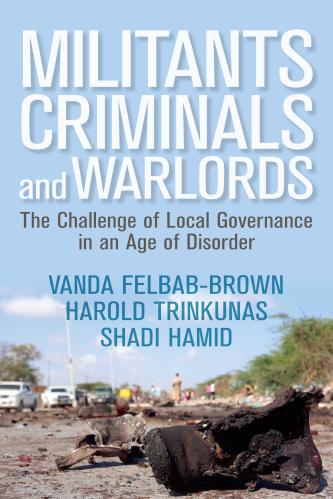
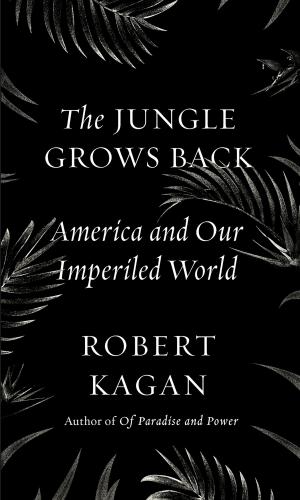
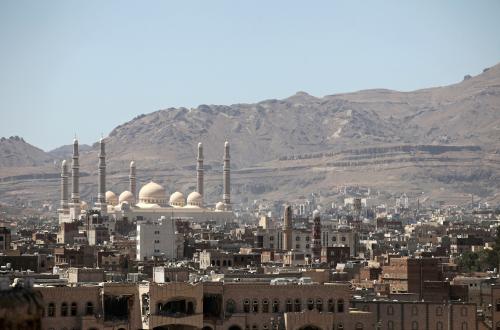
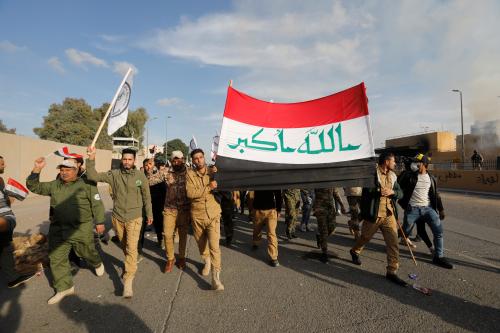
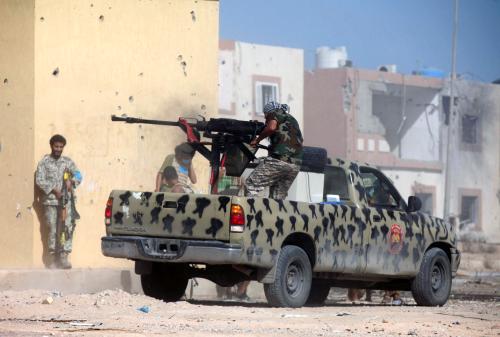




Commentary
UN engagement with nonstate armed groups for the sake of peace: Driving without a roadmap
January 15, 2021